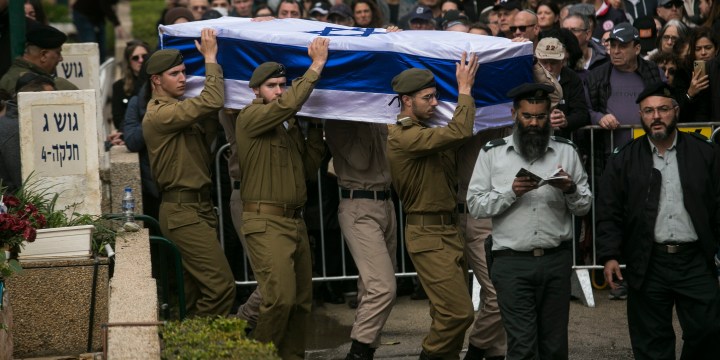MIDDLE EAST CRISIS UPDATE: 24 JANUARY 2024
Israel loses 24 soldiers in Gaza; US and UK launch more airstrikes against Houthis

Israel said 24 of its soldiers were killed in Gaza on Monday, the worst single-day death toll for the military since the war against Hamas began in October.
The Israel Defense Forces said its troops had encircled the southern Gaza city of Khan Younis and dozens of Hamas militants were killed in heavy fighting in the area.
The US and UK launched more airstrikes against the Houthis in Yemen on Monday, the latest salvo in an effort to stop the Iran-backed group’s attacks on ships in the Red Sea.
Israel says 24 soldiers killed in Gaza in worst one-day toll
Israel said 24 of its soldiers were killed in Gaza on Monday, the worst single-day death toll for the military since the war against Hamas began in October.
At around 4pm local time in central Gaza, militants fired on an Israeli tank. At the same time, there were massive explosions at two nearby buildings, a spokesperson for the Israel Defense Forces (IDF) said on Tuesday.
The resulting blasts, near the border fence with Israel, killed 21 servicemen. It was unclear from the IDF’s comments if the militants caused the building explosions.
“The buildings collapsed as a result of this explosion, while most of the soldiers were inside and around the buildings,” the spokesperson said. “The buildings likely exploded from ordnance that our forces set up there to blow up the buildings and the terror infrastructure in the area.”
Read more:
- An isolated Israel commits to war in Gaza — at all costs
- Israel deepens Gaza offensive amid push for hostage talks
Israeli Prime Minister Benjamin Netanyahu said it represented “one of the most difficult days since the start of the war”.
“The IDF has opened an investigation into the disaster,” he said. “We must draw the necessary lessons and do everything to preserve the lives of our soldiers.”
Israeli forces are advancing deeper into the southern and central parts of Gaza and fighting remains intense. Around 200 Israeli soldiers had been killed in the territory before the latest incident, according to the military.
Israel is facing mounting international pressure to wind down the fighting and reach a diplomatic agreement with Hamas — designated a terrorist organisation by the US and European Union — to release more than 100 hostages still held by the group.
Netanyahu has said the war would continue until Hamas was destroyed and all of the captives were freed.
“While we bow our heads in memory of our fallen, we are not relenting, even for a moment, in striving for the goal that has no alternative — achieving total victory,” he said on Tuesday.
Hamas killed around 1,200 people when its militants invaded southern Israel from Gaza on 7 October. Israel’s retaliatory bombardment and ground assault have left more than 25,000 dead, according to the Hamas-run health ministry in Gaza.
US, UK strike Yemen’s Houthis again to stop Red Sea attacks
The US and UK launched more airstrikes against the Houthis in Yemen on Monday, the latest salvo in an effort to stop the Iran-backed group’s attacks on ships in the Red Sea.
Monday night’s moves marked the eighth round of allied attacks on the Houthis since the first on 12 January. US and British forces said they hit eight targets, including an underground storage site and locations for launching missiles and carrying out air surveillance.
The strikes were supported by Australia, Bahrain, Canada and the Netherlands. They were the most significant, according to the US, since the original attacks earlier this month.
Residents in Yemen reported huge blasts at about midnight local time around Sanaa, the capital, and other areas.
Read more:
- Who are the Houthis being hit with US, UK airstrikes?: QuickTake
- Iran’s decades-long bet pays off as Houthi rebels clash with US
- Iran redraws the battlefield of Israel proxy war with new fronts
- A hundred days after shock Hamas attack, Israel is not backing down
“What we have done again is send the clearest possible message that we will continue to degrade their ability to carry out these attacks,” UK Foreign Secretary David Cameron said to reporters.
The Houthis said the latest strikes “will not go without any response or punishment”
The group has caused chaos for shippers by disrupting traffic through the southern Red Sea, a waterway that previously accounted for 12% of global seaborne trade.
The cost of shipping containers between Asia and the Mediterranean has more than tripled since early December, according to Freightos, a cargo-booking company.
The militants, who control much of north-western Yemen including Sanaa and the port of Hodeida, say their campaign is in support of Hamas in its war against Israel. They have vowed to continue attacking vessels until Israel pulls out of Gaza.
Two senior US officials said the 12 and 22 January strikes had significantly reduced the Houthis’ ability to mount maritime attacks. The targets were carefully selected to avoid casualties and minimise the risk of escalation, the officials said.
The Houthi attacks and the US-led response have provoked fears of a wider regional war.
Earlier on Monday, the US said two Navy Seals who went missing during a mission on 11 January to seize Iranian weapons bound for the Houthis were presumed dead. They are the country’s first publicly known military casualties linked to the conflict.
Ships told to transit Red Sea with ‘great care’ after strikes
A key trade group said the US has advised ships that continue to transit the Red Sea to do so with “great care” after a fresh round of joint air strikes with the UK on Yemen’s Houthi militants.
Intertanko, which represents the world’s oil and gas tanker owners, said US Naval Forces Central Command told the group that there was still a heightened threat to vessels with links to the US, UK and Israel, according to a statement.
It also said there had been no recommendation to pause ship traffic after the most recent strikes — unlike in the hours that followed the first salvo earlier this month.
Even so, at least four tanker owners contacted by Bloomberg said they weren’t planning on resuming sailings through the region amid Houthi attacks on vessels and retaliatory airstrikes by the US and UK.
“Right now the status is that no sensible owner will go through,” said Lars Barstad, chief executive officer of Frontline Management, the management unit of one of the world’s largest oil tanker owners. “The risks are just too high to crew, equipment and the environment.”
Read more: Chaos in the Red Sea is starting to bite into companies’ profits
Tanker company Stena Bulk, which controls about 110 vessels, is also still avoiding Red Sea transits, Chief Executive Officer Erik Hanell said by email. DM
Read more in Daily Maverick: Israel-Palestine War


















Time to solve the root of the problem and knock Iran down a few notches